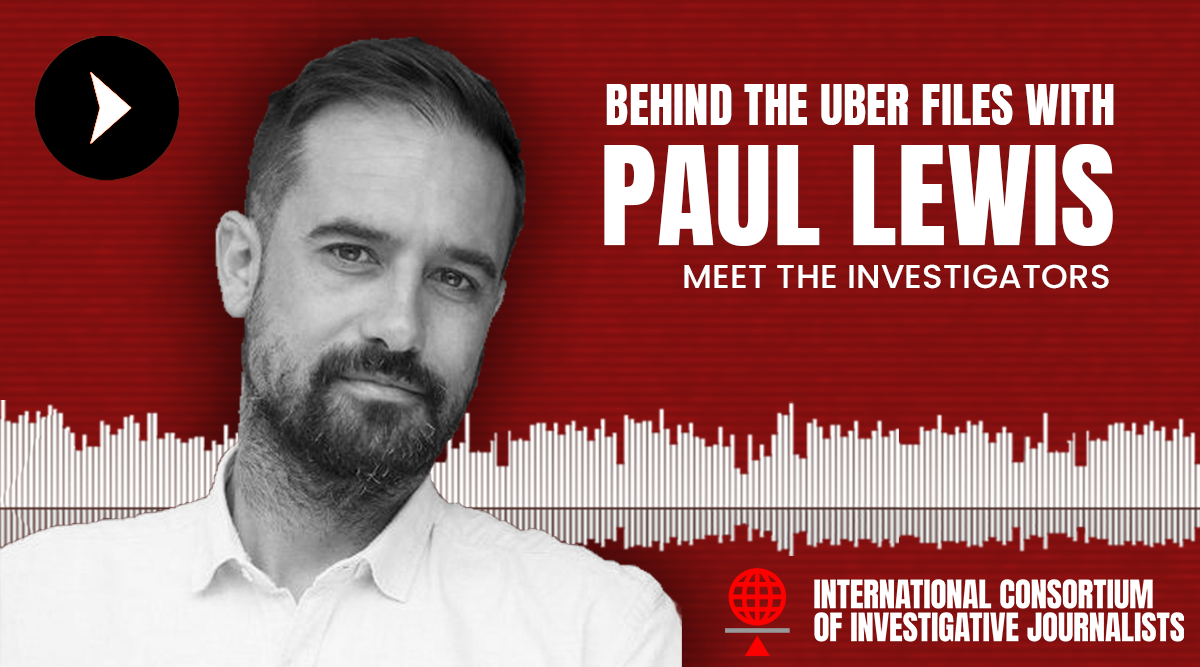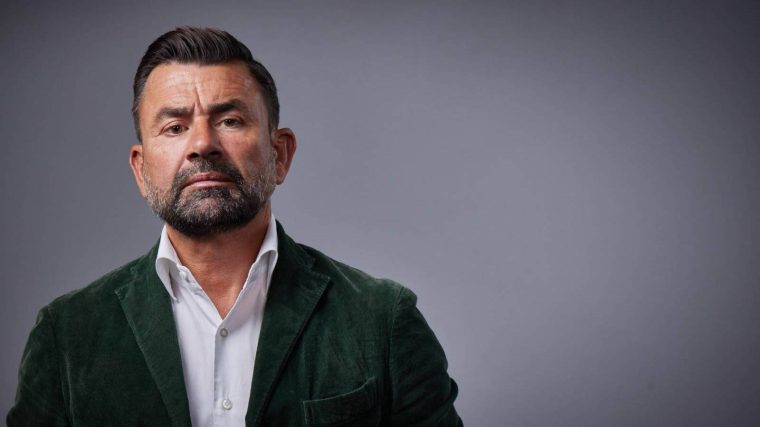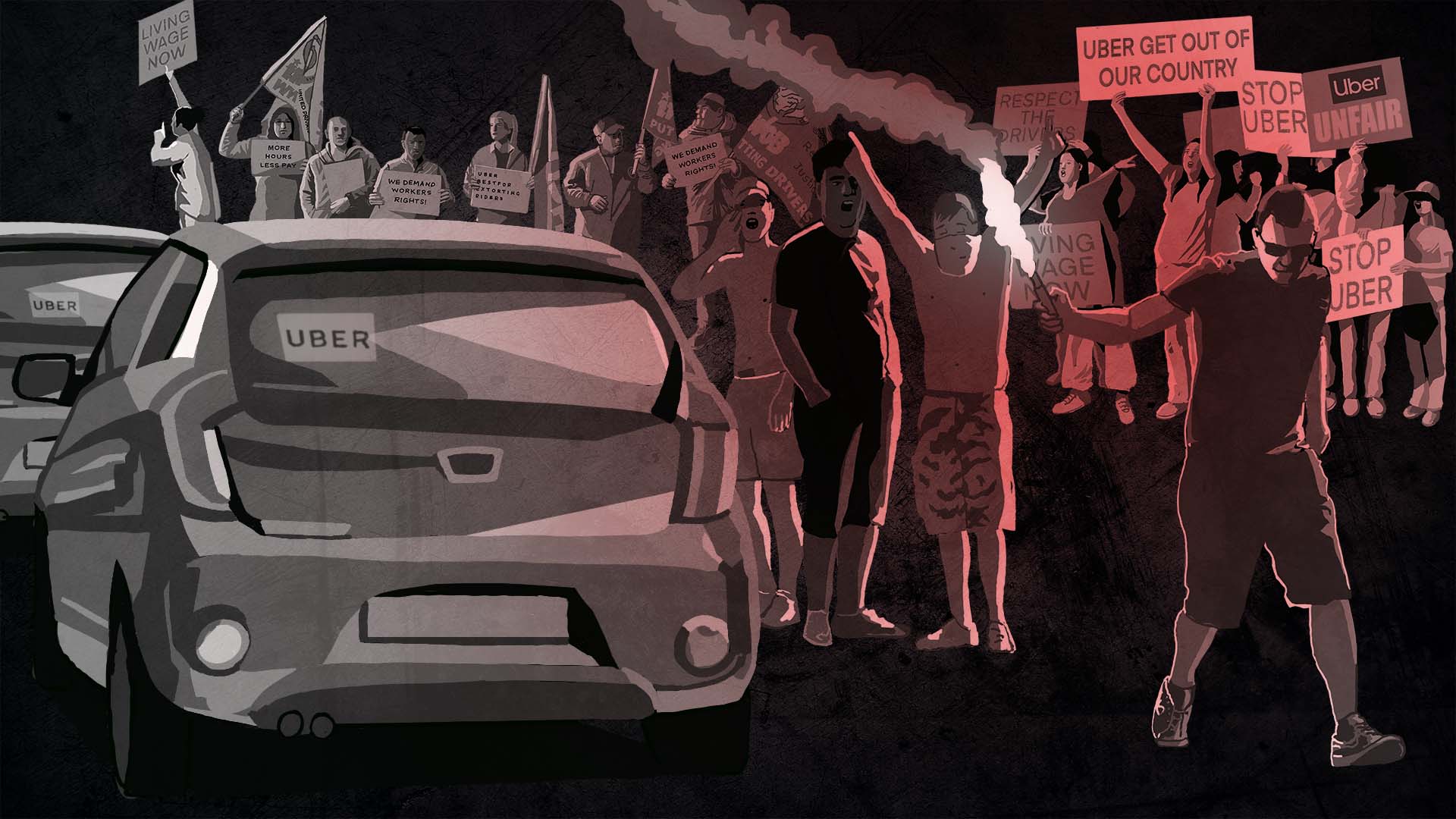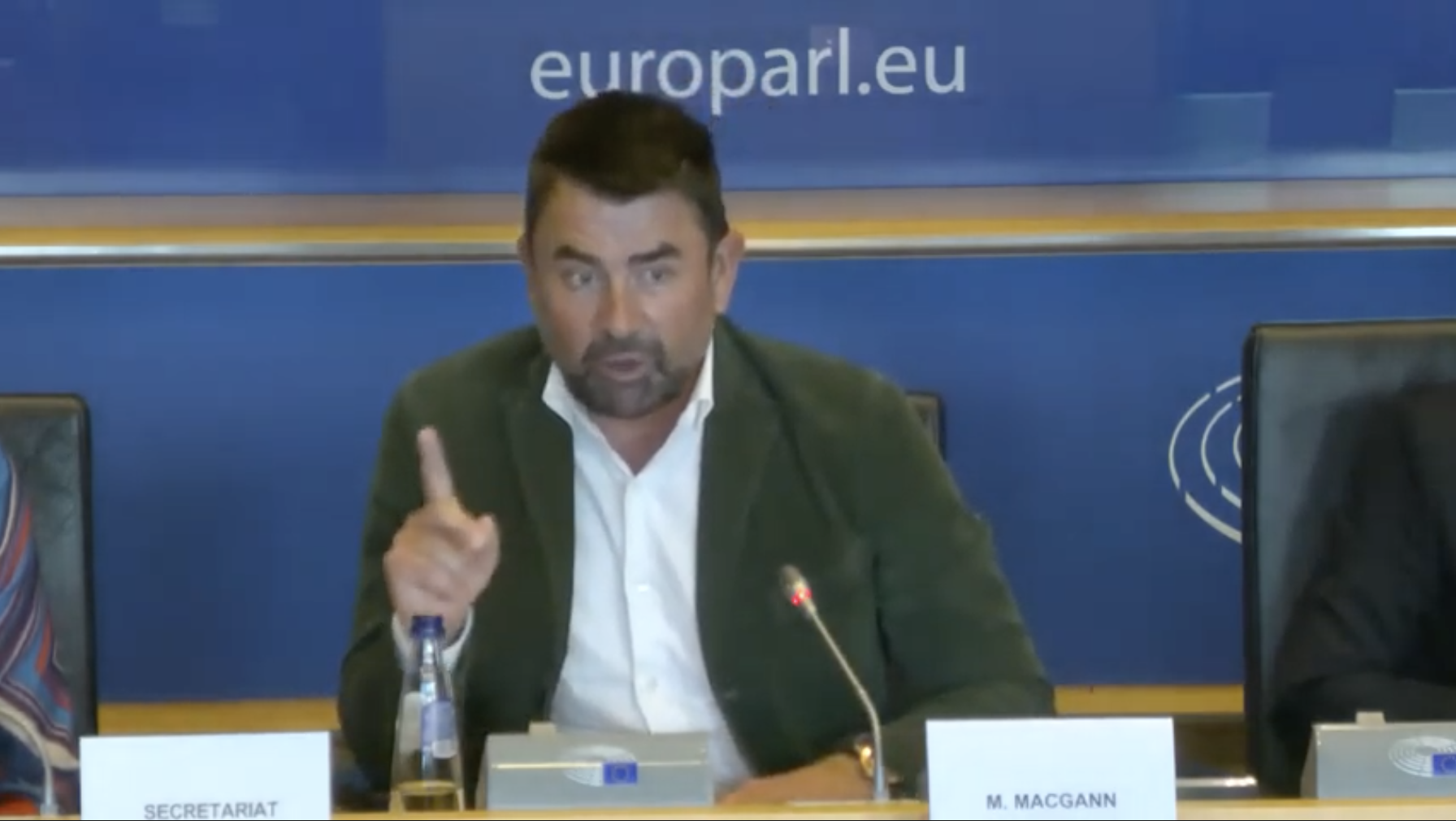MEET THE INVESTIGATORS
Inside the Uber Files, one year later
The investigation unearthed the ride-share company’s ruthless business practices, sparking protests and inquiries worldwide. One year later, The Guardian’s Paul Lewis takes us behind the scenes.

The International Consortium of Investigative Journalists collaborates with hundreds of members across the world. Each of these journalists is among the best in his or her country and many have won national and global awards. Our monthly series, Meet the Investigators, highlights the work of these tireless journalists.
One year ago, ICIJ’s Uber Files led to protests and government inquiries across the globe, after a cache of company documents revealed the company’s ruthless early expansion. In this episode, The Guardian’s investigations editor Paul Lewis walks us through the early days of the project: from covert meetings with a whistleblower on Lake Geneva, to what became a global collaboration of partners from nearly 30 countries.
TRANSCRIPT
Carmen Molina Acosta: Hello and welcome back to Meet the Investigators from the International Consortium of Investigative Journalists. I’m your host, Carmen Molina Acosta, and I’m a producer here at ICIJ.
If you’re joining us for the first time today, Meet the Investigators is a podcast where we hear from ICIJ journalists from across the globe. Today we’re talking to Paul Lewis.
Paul Lewis: I’m head of investigations at The Guardian newspaper, and it was in that capacity that I oversaw in conjunction with colleagues at the ICIJ the Uber files.
[WATERFALL OF NEWS CLIPS: “More than one hundred thousand company documents known as the Uber Files… A bombshell investigation… Documents reportedly show the ride hailing giant used… Extreme steps to aggressively expand worldwide…”]
Carmen: This July marked the one-year anniversary of the Uber Files — a global project that revealed Uber’s ruthless early expansion — and how the company flouted laws, exploited violence against its drivers, and secretly lobbied governments to sidestep regulation and become the tech giant we know today.
For this episode, we’re looking back on that investigation and its impact. Paul is taking us to the very beginning.
Paul: Almost all stories start with a source.
[MARK MACGANN: “In most of the countries under my jurisdiction, Uber was not allowed, was not authorized, was not legal.”]
Carmen: That’s Mark MacGann — the source at the heart of this story. MacGann used to be the chief lobbyist for Uber in Europe, the Middle East and Africa. Since the investigation was published, he’s come forward as the whistleblower who first approached The Guardian with the 189.69 gigabytes of leaked data that came to be known as the Uber Files.

[MARK MACGANN: “The mantra that people repeated from one office to another was the mantra from the top — so don’t ask for permission, just launch, hustle.”]
Paul: It’s quite rare for someone right at the top to decide they want to lift the lid on what’s really been happening. He was in a very unique position, a place that we rarely really ever get to see into, which is: in the room with the chief executive at the time, Travis Kalanick, and other senior executives at the company.
[MARK MACGANN: “I was the one talking to governments, I was the one pushing this with the media, I was the one telling people that they should change the rules because drivers were going to benefit and people were going to get so much economic opportunity. That when that turned out not to be the case, we had actually sold people a lie — how can you have a clear conscience if you don’t stand up and own your contribution to how people are being treated today?”]
Carmen: So Mark contacted The Guardian, and Paul and a team agreed they needed to meet him in person, in a neutral location: Switzerland.
Paul: It was on the shores of Lake Geneva. And I remember seeing Mark come up, and he was rolling his suitcase.
[SUITCASE WHEELS CLATTERING]
Paul: And I thought, oh, has he just got off his plane? Or, you know, we’d scheduled to see each other for a few days — is he planning to fly off prematurely?
But within a few minutes, I realized that in this suitcase were laptops, hard drives, phones and other devices, reams of paperwork, notepads. This was the information that he was considering giving us.
Carmen: Those files, Paul says, ended up providing an unprecedented window into what was happening behind the scenes at what had been the world’s most valuable start-up. The files included discussions at the highest level of the company, between senior executives and government officials — memos, text messages, emails …
This was a period when Uber was basically imposing itself on markets around the world. And when the law was not constructed in a way that was favorable to its business interests, it was breaking the law and then trying to change the law.
— Paul Lewis, The Guardian’s investigations editor
Paul: So much of lobbying just happens behind the scenes. I mean, almost never do you get to see the actual exchange of the text messages between somebody like Emmanuel Macron, who is then economy minister, and somebody like Travis Kalanick, who was the chief executive of Uber, so it was as much about the texture and the nature of the material as it was about the revelations, I think, that made us think that this was a really unique story.
The leak spanned a five-year period, but this was a period when Uber was basically imposing itself on markets around the world. And when the law was not constructed in a way that was favorable to its business interests, it was breaking the law and then trying to change the law. And so, what the Uber Files was able to do was just pull back the curtains on the behind-the-scenes process and how that was happening.
It was very quickly clear to us that this material was relevant in countries all around the world, because Mark MacGann had been operating all over the world.
Carmen: So when The Guardian team touched down in London, it started to become obvious that this story was much, much bigger than them. And they decided to reach out and share the data with ICIJ. The project expanded to include 180 journalists from 29 countries.
Paul: There was an opportunity in deciding to share with the ICJ to draw on the resources that lots of different investigative journalists in the network could bring to bear.
You know, these are people who are brilliant investigative investigators and they have time and they have expertise, and they know their countries really well. There is a moral case, when you have access to such an incredible treasure trove of journalistic material, to make it available to as many journalists as possible.
Carmen: Paul, can you speak a bit to what that collaboration process was like?
Paul: It’s a little bit like herding cats, you know, investigative journalists do not particularly like being told what to do. They all have their own ideas of what their own stories are. They need to be given freedom. We share information as we go along. And so all of that works seamlessly well. There are always complications whenever you’re trying to get lots of people in different time zones with different editorial priorities to loosely coordinate.
That said, there is an enormous amount of goodwill on these projects. You know there really is, because we may have slightly different ideas about what the story should be or what the priority should be, or when certain stories should be published. But we are all basically batting for the same side. You see that people are willing to put aside the particular interests of their own news organization for the wider good.
Carmen: The Uber Files, when it came out, sparked immediate protests…
[PROTESTERS CHANTING IN ROME, JULY 13, 2023]
Carmen: … and triggered inquiries across Europe, including a parliamentary probe in France….
[FRENCH LAWMAKER BENJAMIN HADDAD: “Nous recevons aujourd’hui le représentants de la société Uber, principal concernés par les sujets traités par notre commission d’enquête…”]
Carmen: Uber’s new CEO told French lawmakers that Uber today is a “totally different company” that had moved from “an era of confrontation to collaboration.”
Last month, the report from that parliamentary inquiry was published. It found serious flaws in the country’s system of governing the gig economy, and criticized members of the French cabinet for their close ties to Uber executives, particularly the now president, Emmanuel Macron.
Paul: I think the Uber files revelations did give real serious impetus to EU officials and lawmakers to try to tip the balance in the favor of employees rather than gig-economy companies.
I would also just say, I mean for me, the impact was also about just giving members of the public civil society a window into how money buys power. That in itself has a real value. Often we like to think about impact in terms of legislative change, inquiries, reports, if you like: the establishment taking us seriously.
But some of the best journalism doesn’t result in that, but it has real profound impact on the way people think and understand the world around them. And I really do hope that the Uber Files did achieve that. That for people who were reading it, it was an opportunity for them to reconsider the relationship they have with gig-economy workers, and the model that has led frankly, to gig-economy workers working on, you know, appalling wages and having really substandard employment conditions.
We did hear from Uber drivers and their union and for them that Uber Files was a really significant moment, too, because here was firm evidence backing up much of what they had been saying for a very long time.
Carmen: Paul, one year later, what are some of those big existential questions that the Uber Files brought up that we as a society still have yet to tackle? What is sort of the lasting, long-term impact of this investigation?
Paul: The structural inequality that Silicon Valley has enabled through the gig economy obviously remains. And I think there is going to be a continual tussle as people then subsequently lawmakers try to redress the balance and and put some regulations around these loose freelance relationships.
There’s something quite imperial, about the way in which Uber was operating.
— Paul Lewis, The Guardian’s investigations editor
But on a sort of more foundational level, I think there’s a basic issue about tech and power. This was a company that was based in San Francisco that quite frankly, didn’t really care what the law was like in other countries.
There’s something quite imperial, about the way in which Uber was operating. That cultural feature of big tech is an issue that stretches beyond just big economy companies that they believe themselves to be above and beyond the law in some circumstances outside of the U.S. that they have become, they believe, some of them, too big to regulate.
Carmen: The Uber Files found that the company used stealth technology to thwart intervention by law enforcement, including a “kill switch” that cut off access to the company’s data during police raids. Executives also courted world leaders, government officials, economists and oligarchs to ensure favorable policies, even when their model ran directly counter to the law.
Paul: I mean, it really was extraordinary, I think, that a company could access the upper echelons of government in such a seamless way with virtually no accountability or record of some of these interactions that are happening.
I mean, to give you one example that, for me, was sort of very stark: There was this moment when Joe Biden — he was at the time vice president — was traveling to Davos. And Travis Kalanick, who at the time was Uber’s CEO, was going to have a meeting with him. And the vice president was running late. This meeting was gonna take place in the hotel, and Kalanick wanted to know, well, why the vice president was late. And he sent a WhatsApp message to his colleagues.
He says, I’m at the Intercontinental waiting for Biden, who is late, and then he says: I’ve had my people let him know that every minute late he is, is one less minute he will have with me.
And it obviously tells you quite a lot about how Kalanick, and I would guess, other senior chief executives and CEOs of big tech companies in America, see their relationship with lawmakers. They think they’re beneath them. They don’t think they should be beholden to them.
And you know that ever since the advent of big tech there has been this sort of tension with democracies that feel like any venue to regulate it.
Carmen: Where do journalists fit into a world like that?
Paul: We’re the watchdogs effectively. And when other institutions fail to properly hold companies or industries to account, we’re the failsafe as journalists. It’s the fourth estate — that’s when we come into play. And I think it is the case that regulators and governments did struggle with a company like Uber. And so that’s what made the journalism we were able to do all the more important.
Carmen: Paul got his start at The Guardian as a trainee reporter, but quickly realized his love for investigative storytelling. Now as an editor, he gets to shepard lots of different projects to the finish line. Paul, what advice do you have for someone getting their start in investigative work?
Paul: Go to somewhere that other people aren’t, you know, there’s lots of journalists swimming like fish pursuing the same subject areas, they might be in the same place physically. But often, it’s the path less-trodden that will yield the most exciting and interesting stuff. And so yeah, swimming against the current is, I think, quite a smart thing to do if you’re starting out.
Even if it takes a very, very long time. Even if there are moments where you feel like you’re not going to get to the end. Even if there are periods of reassessment or or changes of direction, but just sticking with it is worth it. Because if you do that enough times, then eventually it will pay off.
Carmen: That was Paul Lewis from The Guardian. You can read up on the latest of the Uber Files on our website, ICIJ.org.
That’s it for this month’s Meet the Investigators. I’m Carmen Molina Acosta. Thanks for tuning in. We’ll see you next month.



